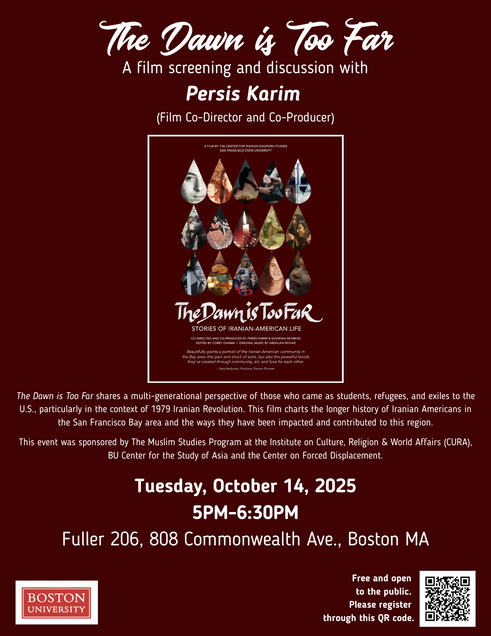10-14-2025 – “The Dawn is Too Far” A Film Screening and Discussion with Persis Karim
Tuesday, October 14, 2025
5 PM – 6:30 PM
Fuller 206, 808 Commonwealth Ave., Boston MA
Please Register here.

The Dawn is Too Far: Stories of Iranian-American Life poetically narrates the story of a community of Iranian Americans who have made the San Francisco Bay Area their home over the past five decades. The film seeks to expand our understanding of Iranian immigration —what it means to leave home and country—and live through the episodes of turbulent histories of dissent, revolution, war, and separation––and reinvent oneself in a new place, country, and culture. The Dawn is Too Far does not paint a story of salvation and happy assimilation, but rather seeks to identify the complex ways that members of the Bay Area’s Iranian diaspora community have navigated the challenges and traumas of history—both Iranian and American––to reinvent themselves and tell their own stories; these as yet untold stories build on a longer history of Iranian immigration to Northern California, where Iranians as students, activists, artists, draw on as well as influence the larger culture of the Bay Area. This community and all that it has faced, offers a more nuanced story of the Iranian diaspora—the ways that this community enriches and enlivens the region where they live, work, and build families and community. The Dawn is Too Far undermines the tired and overplayed news headlines that are dominated by narratives of enmity and mistrust between the government of Iran and the U.S., to offer a more humane understanding of the how people’s lives and the sacrifices they make are part of the larger story of immigration.
Persis Karim (executive produce and co-director/co-producer) is an Iranian-American writer, poet, and professor at San Francisco State University. She grew up in the San Francisco Bay Area, the daughter of an Iranian father who came here in the immediate aftermath of Iran’s military occupation by British and Soviet troops during World War II. She came of age during the 1979 Iranian Revolution and felt a deep concern for how Iran was represented in the media, defying what she experienced in her family and the larger community of Iranian Americans. She has been engaged with the Iranian diaspora community here for more than 30 years in her capacity as a professor, first at San Jose State University, where she founded the Persian Studies program, and then currently as the Director for the Center for Iranian Diaspora Studies at San Francisco State University. She has written extensively on the culture and literature of Iranian Americans and is the editor of three anthologies of Iranian diaspora literature: A World Between: Poems, Short Stories, and Essays by Iranian Americans (1999); Let Me Tell You Where I’ve Been: New Writing by Women of the Iranian Diaspora (2006); and, Tremors: New Fiction by Iranian-American Writers (2013). She also piloted a digital archive of Bay Area Iranian Americans on the DIVA site at SF State as well as did a digital storytelling Karim has worked actively to support and help build the Iranian diaspora community in the Bay Area—largely through her literary and cultural activism. She has watched over three decades from the seat of observer-participant as this community has evolved and grown, welcoming younger generations into it.
Soumyaa Behrens (co-director/co-producer) is an award-winning South Asian Bay Area filmmaker whose work is defined by an attention to women, people of color, and immigrant and marginalized communities. Behrens has directed three other films and is active in the Bay Area film and video community. She teaches documentary filmmaking at San Francisco State University and directs the DocFilm Institute. Behrens spent her childhood traveling back and forth between Illinois and India and the many airports in between. Behrens’s Indian parents were part of an accidental diaspora. They raised Behrens and her other Americanborn sisters, and successfully brought their father’s brothers and families to the U.S. where many of them set down roots. Behrens shares significant personal experiences that mirror those of the Iranian Americans in this film.